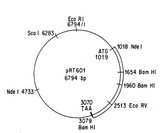 Clontech Laboratories v. Invitrogen Corp. (Fed. Cir. 2005).
Clontech Laboratories v. Invitrogen Corp. (Fed. Cir. 2005).
Clontech sued Invitrogen for falsely marking its biologic products. Under 35 U.S.C. Section 292, falsely marking a product with a patent number or even the word “patent” or “patent pending” is an offense if done with the intent of (i) counterfeiting the mark of a patentee or (ii) deceiving the public. The fine is capped at $500 per offense. At the district court, Invitrogen was found liable for false marking.
On appeal, the CAFC panel noted that this case raises “virtually an issue of first impression.” After reviewing the evidence presented at trial, the panel reversed-in-part, finding clear error in the trial court’s finding that certain test results had put Invitrogen on notice of the falsity of its marks relating to reverse transcriptase.
Regarding its cDNA library products, Invitrogen argued that Section 292 “does not require a good faith belief that the marked article falls within the subject matter” of the claims. The CAFC disagreed with that argument, finding that from a policy perspective, marking should be reliable to permit free and fair competition and commerce. Thus, the appellate panel affirmed the district court ruling that the cDNA library products were falsely marked.